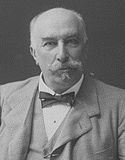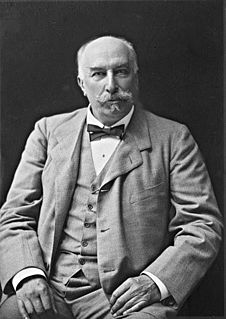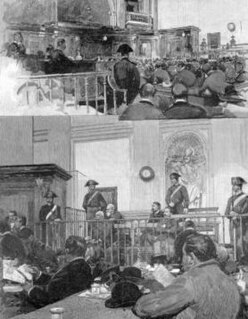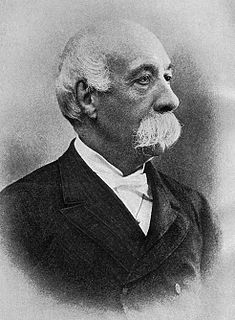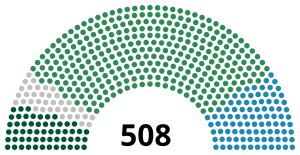
Sidney Costantino, Baron Sonnino was an Italian statesman, 19th Prime Minister of Italy and twice served briefly as one, in 1906 and again from 1909 to 1910. He also was the Italian Minister of Foreign Affairs during the First World War, representing Italy at the 1919 Paris Peace Conference.

Giuseppe Zanardelli was an Italian jurisconsult, nationalist and political figure. He was the Prime Minister of Italy from 15 February 1901 to 3 November 1903. He was a distinguished jurist and eloquent orator, and Grand Master freemason. Zanardelli, representing the bourgeoisie from Lombardy, personified the classical 19th-century left liberalism, committed to suffrage expansion, anticlericalism, civil liberties, free trade and laissez-faire economics. Throughout his long political career, he was among the most ardent advocates of freedom of conscience and divorce.
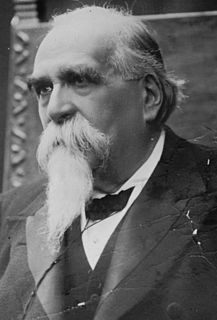
Luigi Luzzatti was an Italian financier, political economist, social philosopher and jurist. He served as the 20th Prime Minister of Italy between 1910 and 1911. He was the first Venetian and second Jewish Prime Minister of Italy after Alessandro Fortis, although his predecessor Sidney Sonnino was of partial Jewish ancestry.

Antonio Starabba, Marquess of Rudinì was an Italian statesman, Prime Minister of Italy between 1891 and 1892 and from 1896 until 1898.

Luigi Gerolamo Pelloux was an Italian general and politician, born of parents who retained their Italian nationality when Savoy was annexed to France. He was the Prime Minister of Italy from 29 June 1898 to 24 June 1900.
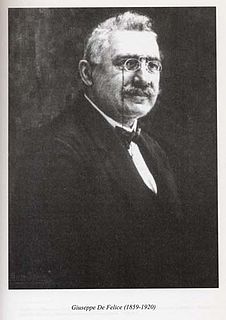
Giuseppe De Felice Giuffrida was an Italian socialist politician and journalist from Sicily. He is considered to be one of the founders of the Fasci Siciliani a popular movement of democratic and socialist inspiration. As the first socialist mayor of Catania in Sicily, from 1902 until 1914, he became the protagonist of a kind of municipal socialism.

Napoleone Colajanni was an Italian writer, journalist, criminologist, socialist and politician. In the 1880s he abandoned republicanism for socialism, and became Italy's leading theoretical writer on the issue for a time. He has been called the father of Sicilian socialism. Due to the Socialist party's discourse of Marxist class struggle, he reverted in 1894 to his original republicanism. Colajanni was an ardent critic of the Lombrosian school in criminology. In 1890 he was elected in the national Italian Chamber of Deputies and was re-elected in all subsequent parliaments until his death in September 1921.
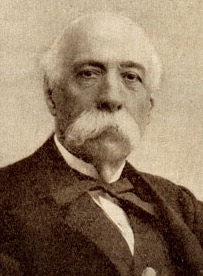
General elections were held in Italy on 23 November 1890, with a second round of voting on 30 November. The "ministerial" left-wing bloc emerged as the largest in Parliament, winning 401 of the 508 seats. As in 1886, the election was held using small multi-member constituencies with between two and five seats.

General elections were held in Italy on 26 May 1895, with a second round of voting on 2 June. The "ministerial" left-wing bloc remained the largest in Parliament, winning 334 of the 508 seats.
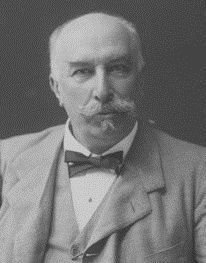
General elections were held in Italy on 21 March 1897, with a second round of voting on 28 March. The "Ministerial" left-wing bloc, led by Giovanni Giolitti remained the largest in Parliament, winning 327 of the 508 seats.

General elections were held in Italy on 3 June 1900, with a second round of voting on 10 June. The "ministerial" left-wing bloc remained the largest in Parliament, winning 296 of the 508 seats.
See also: 1892 in Italy, other events of 1893, 1894 in Italy.
See also: 1891 in Italy, other events of 1892, 1893 in Italy.
See also: 1893 in Italy, other events of 1894, 1895 in Italy.
See also: 1894 in Italy, other events of 1895, 1896 in Italy.

Bernardino Grimaldi was an Italian politician. He was a Minister in several governments.

